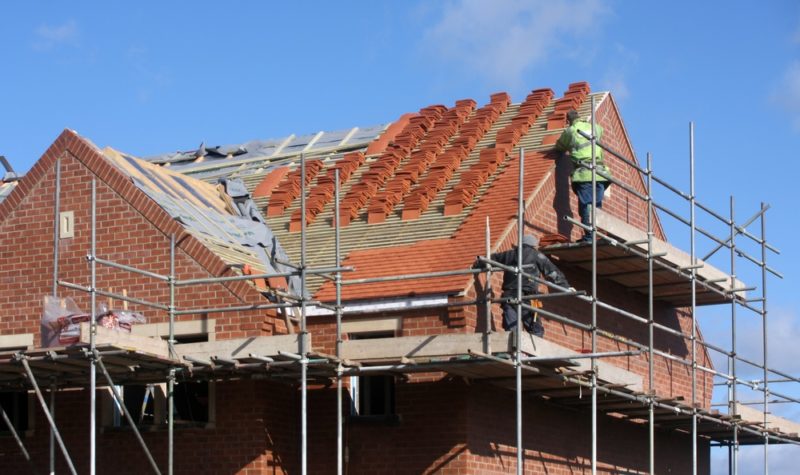Is Barratt Developments a value trap?

As the UK finally invokes Article 50 to leave the EU, the outlook for housebuilders such as Barratt Developments (LON:BDEV) is incredibly uncertain. The company’s shares may have risen 16% already this year, but they continue to trade on a P/E of 9.7 and a prospective dividend yield of 6.9%.
For many investors this could suggest they are a value trap, since the near-term outlook for the UK economy is challenging. Inflation is at its highest level in 3.5 years and this could lead to weak consumer confidence. The affordability of houses may therefore fall this year, which could cause downgrades to EPS forecasts for Barratt and its sector peers.
However, in the long run the outlook for the company and its sector is very different. A growing population coupled with a continued lack of house-building could mean a widening of the current supply deficit. This may lead to rising house prices and higher profitability across the sector.
Short-term issues
According to the Halifax house price index, UK house prices have fallen by 1% since the end of last year. While it is too early to say there will be a house price correction, a slowdown in the growth rate of recent years is already in full swing. In the coming months it would be unsurprising, although by no means guaranteed, for house prices to nudge downwards as the outlook for the UK economy may remain unclear.
At least part of this is due to Brexit. Higher inflation could start to bite, which has been at least partly caused by weaker sterling. With annual wage growth standing at 2.6% and inflation at 2.3% and on an upward trend, it is not difficult to see a scenario where disposable incomes fall in real terms. This could make mortgages less affordable and saving for a deposit tougher for first-time buyers.
In such a scenario, a housebuilder with a low valuation such as Barratt could be viewed as a value trap. Its shares may be cheap, but if its EPS forecasts are downgraded, investor sentiment may worsen and lead to a share price fall.
Long-term potential
While in the short run the housebuilding sector may experience some challenges, in the long run there could be a real growth opportunity. Investors may look back on the house price growth since the financial crisis as a ‘golden era’ for housing. During the period April 2009 to April 2016, UK house prices grew by almost 5% per annum. However, just as the annualised growth in house prices of 12.5% between October 2001 and October 2007 was once viewed as a one-off event, the growth following the financial crisis may not yet be over.
With completions outside of London at their highest levels for nine years and a capital return plan which means ordinary dividends are covered 2.5 times, its prospects for the long run appear to be healthy.
The reason for this is a continued supply deficit which is likely to get much worse in my opinion. During the next decade, the UK’s population is expected to grow by around 420,000 per annum. While not every individual will require their own home, the UK’s house-building of less than 150,000 homes per annum is unlikely to be sufficient to meet demand. Therefore, even though there is an exceptionally high supply deficit already in place, it could increase in the long run.
In my view, this creates an opportunity for housebuilders such as Barratt. Its profitability could benefit from a house price tailwind in future years, which could mean its shares are worthy of a far higher valuation than at present.
A value trap?
Whether Barratt is viewed as a value trap or not probably depends on your time horizon. Short-term investors may be right in thinking the company’s shares could move lower. That’s particularly the case because a spike in uncertainty as Brexit talks start up could mean weaker sterling and higher than expected inflation. In such a scenario, the deterioration in demand for housing and house prices may be more sudden than expected. This could cause a drop in Barratt’s share price.
However, for long-term investors Barratt could be an exceptionally strong buy. The company has a record forward order book and is the only major housebuilder with the HBF 5 Star Customer Satisfaction Award. This may not sound all that important from an investment perspective, but it could mean Barratt does not face the cost both in time and money spent by rivals such as Bovis on customer redress.
In addition, Barratt’s operating margin moved 1.7 percentage points higher in the first half of the current year, while its net cash position of £180 million means it is well-prepared for any downturn in operating conditions. With completions outside of London at their highest levels for nine years and a capital return plan which means ordinary dividends are covered 2.5 times, its prospects for the long run appear to be healthy.
Outlook
Value traps are tough to identify until after a share price fall. With the benefit of hindsight, they seem fairly obvious. In Barratt’s situation, a share price fall cannot be ruled out because of the short-term issues it faces. Inflation is moving higher and the affordability of houses may fall as consumer disposable incomes decline in real terms. Therefore, the 1% fall in house prices since the start of the year could be the start of an extended period of negative growth.
However, in the long run Barratt offers exceptional capital growth potential in my opinion. It has high income prospects, a sound balance sheet and its operational performance has been robust. Further, I think the factors behind rising house prices in recent decades will exacerbate, rather than recede. UK population growth could cause intense pressure on housing and this could lead to further rises in house prices in future years. Set against this backdrop, Barratt’s valuation starts to look highly appealing for long-term investors.
Comments (0)